七年级英语(1)
七年级英语unit1试题及答案

七年级英语unit1试题及答案一、词汇题(共10分)1. 写出下列单词的英文拼写。
(1) 朋友 _______ (2) 学生 _______ (3) 教师 _______ (4) 学校 _______ (5) 家庭 _______答案:(1) friend (2) student (3) teacher (4) school (5) family2. 根据句意及首字母提示补全单词。
(1) This is my _______ (我的) book.(2) She is a _______ (教师) in our school.(3) He has two _______ (兄弟).(4) My _______ (姐妹) is a doctor.(5) We are in the _______ (同一个) class.答案:(1) my (2) teacher (3) brothers (4) sister (5) same二、选择题(共20分)1. What's this in English?A. It's a desk.B. It's an apple.C. It's a pen.D. It's a ruler.答案:C2. How many people are there in your family?A. Three.B. Four.C. Five.D. Six.答案:B3. What does your father do?A. He is a teacher.B. He is a doctor.C. He is a farmer.D. He is a worker.答案:A4. Where is your school?A. In the city.B. In the countryside.C. Near the river.D. Far from the city.答案:C5. What's your favorite subject?A. Math.B. English.C. Chinese.D. History.答案:B三、填空题(共20分)1. This is _______ (我的) classroom.2. That is _______ (她的) bicycle.3. These are _______ (他们的) books.4. Those are _______ (我们的) pens.5. _______ (他的) name is Tom.答案:1. my 2. her 3. their 4. our 5. His四、阅读理解(共30分)阅读下面短文,然后回答问题。
七年级英语上册Unit1复习课件
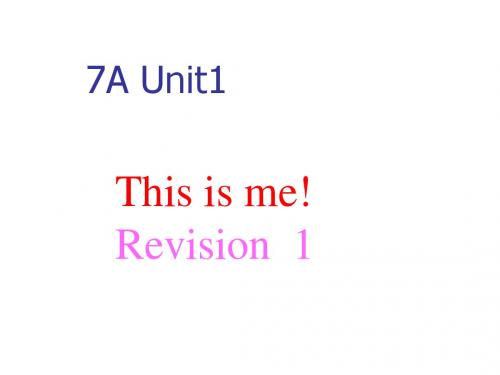
Most verbs +s walk live walks lives
Verbs ending in a consonant +y
-y + ies fly study + es
flies studies
Verbs ending in ss, ch, sh or x
Celebrity profile
Liu Xiang Name :__________ 23 Age:____________
Shanghai Birthplace:_______ sportsman Job:____________ Appearance:______ tall _______________ and strong Playing Hobby:__________ computer games, singing He is good at:____ running _______________
runs (run) every morning. 1.Tom ______ running (run). He _____(be) good at _________ is like reading 2.We _______(like) _______(read). Do like reading ____(do) you ____(like) _______(read)? go shopping 3.My parents ______(go) _________(shop) every shopping Sunday. They ______(love) _________(shop). love come 4.Daniel and Sandy ______(come) from Beijing. living They enjoy ________(live) there. sitting 5.Mr Wu doesn’t ___________(not like) ________(sit) in like his office. He ______(love) _____(do) sports and loves doing playing he ______(be) clever at _______(play) tennis. is
人教版七年级英语下册 Unit 1 知识点与巩固练习
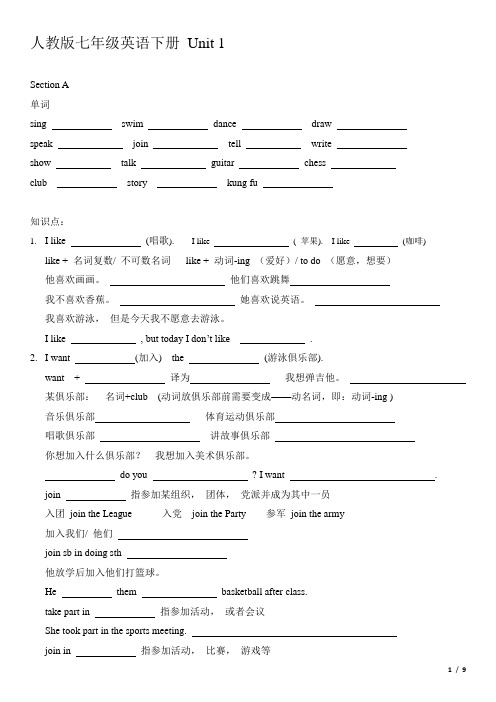
人教版七年级英语下册Unit 1Section A单词sing swim dance drawspeak join tell writeshow talk guitar chessclub story kung fu知识点:1.I like (唱歌). I like ( 苹果). I like (咖啡)like + 名词复数/ 不可数名词like + 动词-ing (爱好)/ to do (愿意,想要)他喜欢画画。
他们喜欢跳舞我不喜欢香蕉。
她喜欢说英语。
我喜欢游泳,但是今天我不愿意去游泳。
I like , but today I don’t like .2.I want (加入) the (游泳俱乐部).want + 译为我想弹吉他。
某俱乐部:名词+club (动词放俱乐部前需要变成——动名词,即:动词-ing )音乐俱乐部体育运动俱乐部唱歌俱乐部讲故事俱乐部你想加入什么俱乐部?我想加入美术俱乐部。
do you ? I want .join 指参加某组织,团体,党派并成为其中一员入团join the League 入党join the Party 参军join the army加入我们/ 他们join sb in doing sth他放学后加入他们打篮球。
He them basketball after class.take part in 指参加活动,或者会议She took part in the sports meeting.join in 指参加活动,比赛,游戏等He wants to join in the game .3.弹吉他下象棋踢足球play +球,棋,牌:打篮球打牌play +the+乐器:弹钢琴打鼓4.Can you ( 说英语) ? Yes , .Can you (画画)? No,can 是,后面接,can not =他会说英语,但是他不会讲故事。
He can , but he你会干什么?我会下象棋。
七年级英语(上册)Unit1语法+知识点汇总

Unit 1 My name’s Gina.语法专项:形容词性物主代词教材典句1. W hat’s his name ? 他叫什么名字?—His name’s Eric . 他的名字叫埃里克。
2. What’s her name ? 她叫什么名字?—She’s Mary . 她叫玛丽。
3. What’s your telephone number , Li Xin ? 李欣,你的电话号码是什么?以上句子中分别含有形容词性物主代词his,her, your,今天我们就来学习一下形容词性物主代词的用法。
语法全解物主代词是表示所有关系的代词,是人称代词的属格形式。
它分第一人称、第二人称和第三人称,每个人称又分单数和复数。
物主代词可分为形容词性物主代词和名词性物主代词。
本单元主要涉及形容词性物主代词。
第一人称第二人称第三人称单数复数单数复数单数复数形容词性物主代词Our我的Our我们的Your你的Your你们的His他的Her她的Its它的Their他、她、它们的形容词性物主代词的用法与形容词的用法相似,可以修饰名词,一般放在被修饰的名词之前,不能单独使用。
如果名词前面还有其他的定语,物主代词要放在其他定语的前面。
my pen 我的钢笔my red pen 我的红色钢笔your name 你的名字his mother 他的母亲练一练:①. Please send ________ best wishes to Mary . A. IB. meC. myD. mine ②. __ Does Miss White like sports ?__ Yes, _________ favorite sport is tennis . A. heB. sheC. hisD. her ③. This is ________ pen .A. red myB. he redC. red hisD. herred④. __ I’m Linda. What’s your name ? _________ name is Lucy .A. IB. MeC. MyD. Mine4. 介绍自己:(1)My name’s+名字我的名字叫......(2)I’m+名字我是......5. 询问姓名(1)What’s your name? 你叫什么名字?----Alan.艾伦。
初中英语七年级上册Unit 1(含答案解析)

一、选择题1.— Hello!________ cup is blue. What color is ________ cup?—It’s white.A.My;you B.I;you C.I;your D.My;your D解析:D【详解】句意:——你好!我的杯子是蓝色的。
你的杯子是什么颜色的?——它是白色的。
考查物主代词。
根据句子结构,空格处后面都是名词cup,故两个空都应填入形容词性物主代词修饰cup。
四个选项中只有D选项两个都是形容词性物主代词,故选D。
2.How is _______ sister?A.I B.you C.your D.he C解析:C【解析】【详解】句意: 你妹妹好吗? I我,主格形式;you你,主格形式或宾格形式;your你的,形容词性物主代词;he他,主格形式。
名词sister 前要用形容词性物主代词。
故选C。
3.— _______ ?—Huang.A.What’s thisB.How are youC.What color is itD.What’s your last name D解析:D【解析】【详解】句意:——你姓什么?——姓黄。
What’s this? 这是什么? How are you? 你好吗? What color is it? 它是什么颜色的? What’s your last name? 你姓什么? 根据答语“黄”可知问句是对姓提问。
特别注意: 黄色的英文是yellow。
故选D。
4.—______—It’s 938-1423 .A.What’s your phone number ?B.What’s your name ?C.How are you ?D.Who is your friend ?A解析:A【详解】句意:----你的电话号码是多少?----它是938-1423。
考查情景交际。
A. What’s your phone number? 你的电话号码是多少;B. What’s your name? 你叫什么名字;C. How are you ? 你好吗;D. Who is your friend? 你的朋友是谁?根据回答“它是938-1423。
七年级英语unit1短语

Unit 1 重点短语1.play chess/basketball下象棋/打篮球2.play the guitar 弹吉他3.art/music/chess/swimming/English/sports club 美术/ 音乐/国际象棋/游泳/英语/体育俱乐部4.the story telling club 讲故事俱乐部5.be good at doing sth.擅长于做某事be good for对....有好处be good to对....友好be good with善于应付....的;对....有办法6.tell sb. sth告诉某人某物tell sb(not) to do sth告诉某人(别)做某事tell a story 讲一个故事tell stories 讲故事7.like doing do sth.喜欢做某事(指经常喜欢)like to do sth.喜欢去做某事(指具体和偶尔某一次喜欢)8.school show 学校演出9.talk to/with...跟....说/ 与....交谈10.after school 放学后11.do kung fu 练功夫12.in the music room 在音乐室13.want sth.想要某物want to do sth.想要做某事want sb .to do sth.想要某人做某事14.play the violin/drums/piano 拉小提琴/敲鼓/弹钢琴15.play soccer/games 踢足球/做游戏16.play..with...和....玩......17.the old people’s home 敬老院、养老院18.be free 有空,是免费的19.be good with sth./sb.善于应付....的;对....有办法20.make friends (with sb) (和某人)交朋友21.call sb. at+号码拨.....给某人打电话22.have time 有时间23. music festival 音乐节music room音乐教室24. on the weekend/ on weekends (在)周末25.help(sb)with sth在某方面帮助某人help sb (to) do sth帮助某人做某事26.b e in成为27.t each sb. to do sth教某人做某事28.n eed sth需要某物need(sb)to do sth需要做某事29.s peak English/Chinese说英语/汉语。
人教版七年级上册英语unit1知识要点

Unit 1 My new classmates 知识要点一、单词1. meet:v.相遇,见面2. friend:n.朋友3. our:pron.我们的4. classmate:n.同学5. this:adj.pron.这;这个6. those:pron.那些7. look:v.看8. new:adj.新的9. good:adj.好的10. boy:n.男孩11. girl:n.女孩12. from:prep.从……来13. America:n.美国14. China:n.我国15. Japan:n.日本16. Korea:n.韩国17. England:n.英格兰18. Russia:n.俄罗斯19. Th本人land:n.泰国20. France:n.法国21. Australia:n.澳大利亚二、重点句型1. Nice to meet you.:很高兴见到你。
2. Are they from China?:他们来自我国吗?3. Where is he from?:他来自哪儿?4. Look at the new student.:看看这位新同学。
三、语法1. 形容词的最高级形容词比较级+than+其他成分如:Tom is taller than Mike.特殊形容词:good-better-best,bad-worse-worst,much/many-more-most,little-less-least2. 人称代词的对象形式主格:I,you,he,she,it,we,they宾格:me,you,him,her,it,us,them如:This is my friend. I like him.3. 介词from的用法用来表示人或事物所从属的国家或地点如:He is from China. She is from Japan.四、交际用语1. 自我介绍Hello, I’m Mary. Nice to meet you.2. 询问他人来自何处Where are you from?3. 介绍他人身份This is my friend, John. He is from England.4. 与他人交谈Look at the new student. He is from Australia.以上就是人教版七年级上册英语unit1的知识要点,通过学习这些内容,相信同学们可以更好地掌握本单元的知识,轻松应对课堂教学和课后作业。
人教版七年级上册英语Unit1 词汇和语法 (含答案)
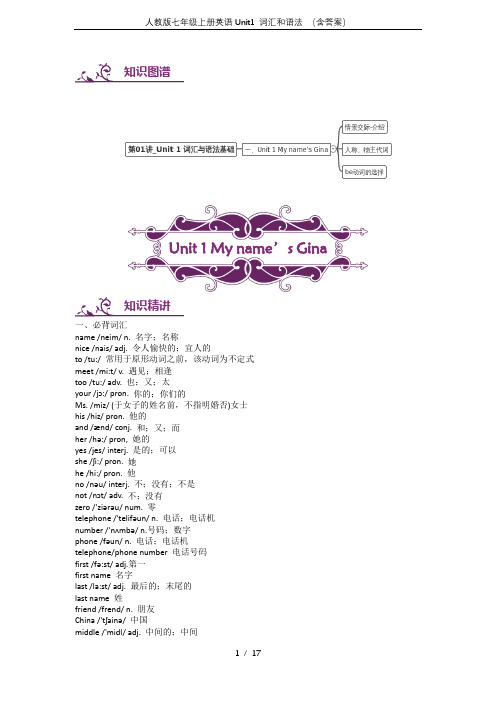
知识图谱Unit 1 My name’s Gina知识精讲一、必背词汇name /neim/ n. 名字;名称nice /nais/ adj. 令人愉快的;宜人的to /tu:/ 常用于原形动词之前,该动词为不定式meet /mi:t/ v. 遇见;相逢too /tu:/ adv. 也;又;太your /jɔ:/ pron. 你的;你们的Ms. /miz/ (于女子的姓名前,不指明婚否)女士his /hiz/ pron. 他的and /ænd/ conj. 和;又;而her /hə:/ pron, 她的yes /jes/ interj. 是的;可以she /ʃi:/ pron. 她he /hi:/ pron. 他no /nəu/ interj. 不;没有;不是not /nɔt/ adv. 不;没有zero /'ziərəu/ num. 零telephone /'telifəun/ n. 电话;电话机number /'nʌmbə/ n.号码;数字phone /fəun/ n. 电话;电话机telephone/phone number 电话号码first /fə:st/ adj.第一first name 名字last /la:st/ adj. 最后的;末尾的last name 姓friend /frend/ n. 朋友China /'tʃainə/ 中国middle /'midl/ adj. 中间的;中间school /sku:l/ n. 学校middle school 中学;初中二、重点词汇1. nice adjective /naɪs/1). pleasant, enjoyable, or satisfactory愉快的;美好的;满意的例句:Did you have a nice trip?你假期过得愉快吗?Have a nice day/time!祝你度过愉快的一天/过得愉快!2). kind, friendly, or polite好心的;友善的;有礼貌的例句:I wish you'd be nice to your brother.我希望你会好好对待你弟弟。
初一上英语unit1总结

初一上英语unit1总结
初一上英语 Unit 1 主要包含了以下几个方面的内容:
1. 词汇与短语,这个单元中涉及了一些基础的英语词汇和短语,比如 greetings(问候语)、introductions(介绍)、numbers
(数字)、classroom objects(教室物品)等。
通过学习这些词汇
和短语,我们可以更好地进行日常生活中的交流和表达。
2. 句型与语法,在 Unit 1 中,我们学习了一些基本的句型和
语法知识。
比如,学习了一般现在时的肯定句、否定句和疑问句的
构成和用法;学习了人称代词的主格和宾格形式的区别和用法;学
习了一些常用的疑问词,如 what、where、when、how 等。
这些知
识点对于我们正确理解和使用英语句子非常重要。
3. 对话与交流,在这个单元中,我们通过对话和交流的方式来
练习和应用所学的词汇和语法知识。
通过模拟真实情境,比如自我
介绍、问候、询问时间等,我们可以提高自己的口语表达能力和听
力理解能力。
4. 阅读与写作,在 Unit 1 中,我们也进行了一些简单的阅读
和写作练习。
通过阅读短文,我们可以提高自己的阅读理解能力,并学习一些常用的句子结构和表达方式。
通过写作练习,我们可以提升自己的写作能力,培养用英语表达思想的能力。
总结起来,初一上英语 Unit 1 主要涵盖了词汇与短语、句型与语法、对话与交流以及阅读与写作等方面的内容。
通过学习这些知识,我们可以建立起基本的英语交流能力,并为以后的学习打下坚实的基础。
七年级英语上册Unit1知识点总结
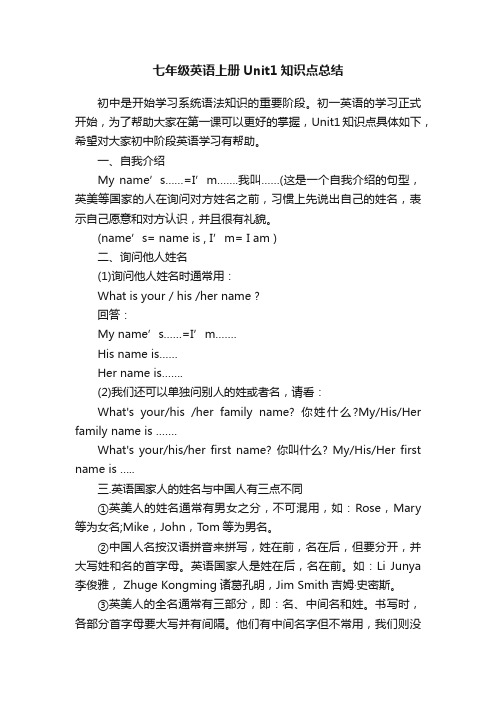
七年级英语上册Unit1知识点总结初中是开始学习系统语法知识的重要阶段。
初一英语的学习正式开始,为了帮助大家在第一课可以更好的掌握,Unit1知识点具体如下,希望对大家初中阶段英语学习有帮助。
一、自我介绍My name’s……=I’m…….我叫……(这是一个自我介绍的句型,英美等国家的人在询问对方姓名之前,习惯上先说出自己的姓名,表示自己愿意和对方认识,并且很有礼貌。
(name’s= name is , I’m= I am )二、询问他人姓名(1)询问他人姓名时通常用:What is your / his /her name ?回答:My name’s……=I’m…….His name is……Her name is…….(2)我们还可以单独问别人的姓或者名,请看:What's your/his /her family name? 你姓什么?My/His/Her family name is …….What's your/his/her first name? 你叫什么? My/His/Her first name is …..三.英语国家人的姓名与中国人有三点不同①英美人的姓名通常有男女之分,不可混用,如:Rose,Mary 等为女名;Mike,John,Tom等为男名。
②中国人名按汉语拼音来拼写,姓在前,名在后,但要分开,并大写姓和名的首字母。
英语国家人是姓在后,名在前。
如:Li Junya 李俊雅, Zhuge Kongming诸葛孔明,Jim Smith吉姆·史密斯。
③英美人的全名通常有三部分,即:名、中间名和姓。
书写时,各部分首字母要大写并有间隔。
他们有中间名字但不常用,我们则没有中间名字。
如:Ronald Wilson Reagan (罗纳德·威尔逊·里根) First name:Middle name:Last name / family name:四、Be动词:是一种特殊的动词。
七年级英语unit1知识点总结
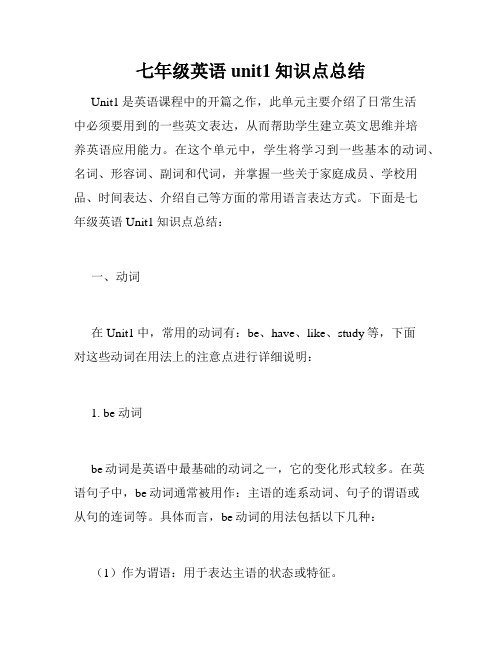
七年级英语unit1知识点总结Unit1是英语课程中的开篇之作,此单元主要介绍了日常生活中必须要用到的一些英文表达,从而帮助学生建立英文思维并培养英语应用能力。
在这个单元中,学生将学习到一些基本的动词、名词、形容词、副词和代词,并掌握一些关于家庭成员、学校用品、时间表达、介绍自己等方面的常用语言表达方式。
下面是七年级英语Unit1知识点总结:一、动词在Unit1中,常用的动词有:be、have、like、study等,下面对这些动词在用法上的注意点进行详细说明:1. be 动词be动词是英语中最基础的动词之一,它的变化形式较多。
在英语句子中,be动词通常被用作:主语的连系动词、句子的谓语或从句的连词等。
具体而言,be动词的用法包括以下几种:(1)作为谓语:用于表达主语的状态或特征。
例如:My father is a teacher.(我爸爸是一名教师。
)(2)作为非谓语:通常用于表达一定的习惯或行为方式。
例如:I am used to getting up early in the morning.(我习惯早起。
)(3)作为连词:用于连接句子或名词。
例如:The book is mine.(这本书是我的。
)2. have 动词have动词是常用的实义动词,表示“拥有”、“持有”等意义。
在不同的句型、语态中,have动词的用法稍有不同,主要包括以下三种情况:(1)存在或拥有某种状态、性质。
例如:He has a big house.(他有一幢大房子。
)(2)表示某种动作、行为、经历等。
例如:I have finished my homework.(我已经完成了我的作业。
)(3)构成一些固定短语,表示某种动作或行为。
例如:have a headache(头痛)、have a break(休息一下)、have a good time(玩得开心)等。
3. like 动词like动词表示“喜欢”的意思,它可以单独作为动词,也可以加上动词的-ing形式作为宾语补足语,具体而言,其用法及注意点如下:(1)like作为动词时,它的主语通常是人,宾语可以是人或物。
初中英语新人教版七年级上册Unit 1 知识点(2024秋)

七年级英语上册Unit1 SA知识点1.How do we make new friends ? 我们如何交新朋友?【用法详解】Make friends译为“交朋友”,如果要表达“和某人交朋友”则用“make friends with sB.”的结构。
Eg: She wants to make friends with Lucy.她想要和露西交朋友。
【即学即用】1.让我们和他交朋友吧! (汉译英)Let’s _make_ _friends_ _with_ him.2.Introduce yourself.自我介绍。
【用法详解】 Introduce (动词) “介绍”常见搭配:Introduce A to B 把A介绍给BIntroduce oneself 自我介绍Eg: Please introduce me to Mary.请把我介绍给玛丽。
Please introduce yourself.请你做一个自我介绍。
【知识拓展】(1)yourself为反身代词,译为“你自己”,其复数形式常为yourselves“你们自己”其它反身代词有:myself (我自己); himself (他自己); herself (她自己); itself (它自己); yourselves (你们自己); themselves (他们自己);ourselves (我们自己) 常见搭配:enjoy myself 玩得高兴;过得愉快Eg: I enjoyed myself last night at the party.昨晚在派对上我玩得很高兴。
(2)用法及位置* 作宾语时可位于动词、介词之后Eg: Tom enjoyed himself at the dancing party.汤姆在舞会上玩得很开心。
(himself位于动词enjoy之后)He can take care of himself.他可以照顾他自己。
(himself位于介词of之后)* 作表语时可位于系动词之后Eg: Mary hasn’t quite been herself recently.玛丽最近不在状态。
七年级英语下册unit1知识点总结
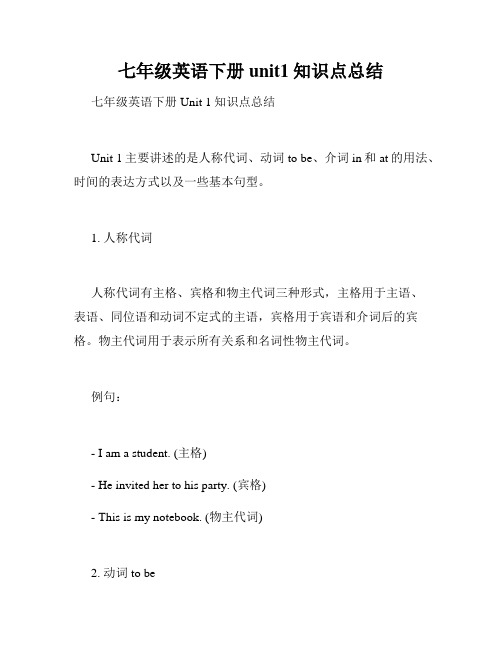
七年级英语下册unit1知识点总结七年级英语下册Unit 1知识点总结Unit 1主要讲述的是人称代词、动词to be、介词in和at的用法、时间的表达方式以及一些基本句型。
1. 人称代词人称代词有主格、宾格和物主代词三种形式,主格用于主语、表语、同位语和动词不定式的主语,宾格用于宾语和介词后的宾格。
物主代词用于表示所有关系和名词性物主代词。
例句:- I am a student. (主格)- He invited her to his party. (宾格)- This is my notebook. (物主代词)2. 动词to be动词to be是英语中最基本的动词之一,表示“是、在、有”等意思。
根据主语的不同人称和数形式,动词to be要进行相应的变化。
例句:- I am a student. (一般现在时)- He was sick yesterday. (一般过去时)- They will be at home tomorrow. (一般将来时)3. 介词in和at的用法in和at都是时间和地点的介词,但是它们的用法略有不同。
in用于指一段时间、季节和年代等长时间段,而at则用于具体的时间点、位置和事件。
例句:- We have English class in the morning. (时间段)- Sarah was born in 2005. (年代)- We will have a party at 7pm. (具体时间点)4. 时间的表达方式时间可以通过以下方式来表达:- 数字:例如1, 2, 3等数字,表示几点钟。
- AM和PM:AM表示上午,PM表示下午或晚上。
- 词语:例如morning, afternoon, evening, night等。
- 固定表达方式:例如at noon, at midnight等。
例句:- It's 3 o'clock in the afternoon. (数字)- I usually get up at 7am. (AM)- We had dinner in the evening. (词语)- The movie will start at midnight. (固定表达方式)5. 基本句型英语中常见的句型有肯定句、否定句、一般疑问句和特殊疑问句。
人教版七年级英语上册Unit1

Conversation 1: Tony: Hello. What’s your name? Jenny: My name’s Jenny. Tony: I’m Tony. Jenny: Nice to meet you, Tony.
Conversation 2: Bill: What’s his name? Maria: His name is Tony. Bill: And what’s her name? Maria: Her name is Jenny.
提高题:按要求改写句子.
1. I’m Gina. (同义句) My name ____ ____ is Gina. 2. My jacket is green and white .(划线提 问) What _______ color is your jacket? _______
知识拓展
A: What’s his name ? B: His name is Yao Ming. Xi Jinping. C: He is Yao Ming. Xi Jinping
Nice to meet you! 很高兴认识你!
Grammar Focus
What’s your name?
My name’s Jenny. I’m Jenny.
your :你的; 你们的 What’s是 What is的缩写,意为“是什么?”。 I’m 是I am 的缩写,意为“我是…”,“我叫…”。 What’s his name? His name’s Tony. What’s her name? Her name’s Gina. his :男他的 her:女她的 name’s是name is的缩写,意为“名字是…”。
his
英语七年级下册(1)

英语七年级下册Unit 1: My School LifeLesson 1: Introduction to School LifeIn this lesson, we will introduce the topic of school life. We will learn some common phrases and expressions related to school and education.Vocabulary•school: a place where students go to learn•classroom: a room where students have lessons•teacher: a person who teaches in a school•student: a person who studies at a school•homework: tasks given to students to be completed outside of school•test: an assessment of a student’s knowledge a nd skills•grade: a mark or score given to a student’s work or performance•timetable: a schedule that shows when different lessons or activities take place•subject: a particular area of study, such as math, English, or science•extracurricular activities: activities that students participate in outside of regular classroom hoursExpressions•What grade are you in? (你在几年级?)•I am in grade seven. (我在七年级。
(必考题)初中英语七年级上册Unit 1(答案解析)

一、选择题1.—I’m David. Nice to see you!— ________.A.Thank you B.I’m fine, thanksC.Good afternoon D.Nice to meet you, too D解析:D【详解】句意:——我是大卫。
很高兴见到你。
——我也很高兴见到你。
考查情景交际。
A. Thank you谢谢;B. I’m fine, thanks我很好,谢谢;C. Good afternoon下午好;D. Nice to meet you, too我也很高兴见到你。
根据英语表达习惯,初次见面时,别人说Nice to see/ meet you时,回答通常也是Nice to see/ meet you, too。
D选项符合句意,故选D。
2.—Is your name Jim Brown?—A.Yes, it is. B.Yes, I am.C.Yes, I’m. D.No, I’m not.A解析:A【解析】【详解】句意: ——你的名字是吉姆·布朗吗? ——是的,它是。
Yes, it is. 是的,它是; Yes, I am.是的,我是;Yes, I’m. 是的,我是;No, I’m not.不,我不是。
一般疑问句肯定答语, 用yes; 问句主语为“your name”, 答语中用代词it。
故选A。
3.—My name is Mary Brown.—What’s your _______ name?—Brown.A.first B.full C.family D.nick C解析:C【解析】【详解】句意: ——我的名字叫玛丽·布朗。
——你的姓是什么? ——布朗。
英美姓名, 名在前, 姓在后。
first name名,full name全名,family name(姓)=last name。
Mary Brown中Mary是名,Brown是姓。
七年级上册英语正式1单元

七年级上册英语正式1单元
以下是七年级上册英语第一单元的简介:
七年级上册英语第一单元的主题是“问候和介绍”。
这个单元主要教授学生如何使用英语进行基本的自我介绍和问候,包括如何询问和回答名字、年龄、家庭成员等基本信息。
学生将学习使用一些常见的问候语,如“Hello”、“Hi”、“Good morning”等,以及如何使用“My name is…”、“I am…years old”、“I have…”等句型进行自我介绍。
此外,学生还将学习如何使用“What’s your name?”、“How old are you?”等句型询问他人的基本信息。
通过这个单元的学习,学生将能够用英语进行基本的交流,并开始建立自己的英语语言基础。
他们将学习如何使用英语进行日常对话,并了解一些基本的社交礼仪和文化习惯。
此外,这个单元还将教授学生一些基本的单词和语法知识,帮助他们更好地理解和使用英语。
以上是简要介绍,如果需要更多信息,可以阅读教材或咨询英语教师。
- 1、下载文档前请自行甄别文档内容的完整性,平台不提供额外的编辑、内容补充、找答案等附加服务。
- 2、"仅部分预览"的文档,不可在线预览部分如存在完整性等问题,可反馈申请退款(可完整预览的文档不适用该条件!)。
- 3、如文档侵犯您的权益,请联系客服反馈,我们会尽快为您处理(人工客服工作时间:9:00-18:30)。
教学质量调查 七年级英语(Module 1) 第 1 页 (共4页) 教学质量调查 七年级英语(Module 1) 第 2 页 (共4页)2010—2011第一学期新课程课堂练习七年级英语 Module 1 Nice to meet youI. 听力A. 听句子,根据所听内容选择相应的答案. ( )1. A. Nice to meet you, too.B. Good morning.C. My name’s Tony. ( )2. A. I’m Ann. B. Hello. C. What’s your name? ( )3. A. I’m fine, thank you. B. How are you? C. Hoe do you do? ( )4. A. I am English. B. Yes, I am English. C. Yes, I am from America. ( )5. A. Y ou are too kind. B. I’m from China. C. Thank you. B. 听对话和问题,根据所听内容选择正确的答案。
( )6. A. Mrs Zhou. B. Miss Sun. C. Mr. Zhou. ( )7. A. Y es, they are. B. No, they aren’t. C. Yes, we are. ( )8. A. He is 12. B. He is 13. C. He is 30. ( )9. A. He’s from Beijing. B. He’s from Shanghai. C. He’s from England. ( )10. A. Linda and Daming. B. Daming and Betty. C. Betty and Linda. C. 听短文,根据所听内容写单词,每空一词。
Hello, boys and girls. I’m you new _ __11_____ teacher this __ _12_____. My name’s Jenny King. I’m __ __13_____. I’m from New York. This is our ____14____ class and I can help you to learn ___ _15_____. I think I can be your good friend. II. . 词汇。
A. 根据句意及所给汉语提示,写出空缺处单词的正确形式。
1. My name is Wang Zheng, and I’m ___________ (十三) years old.2. Stand up please. Don’t _________ down (坐下).3. Please don’t ____________ (看书) in bed.4. His mother is a _______________ (语文) teacher.5. Xiao Mei is a _______________ (学生) in No. 5 Middle School in Tianjin. B. 用所给词的适当形式填空。
1. He comes from _____________ (English).2. Who teaches ____________ (we) English this term?3. In England, the first name is the _________ (give) name.4. We’re in different ____________ (class).5. Jim and Tom ______________ (be) in the same city. III. 选择填空。
( )1. ----Where are you from?----____ from Beijing. A. He’s B. We are C. She’s( )2. ----What’s ____ name?----____ name is Lingling. A. my; You B. your; My C. your; His( )3. ----Bill, this is Tom.----Tom, ____----Nice to meet you, Bill. A. nice to meet you. B. how are you? C. how old are you?( )4. ----____ are you? ----I am twelve.A. WhatB. WhereC. How old( )5. We are ____ Class Two.A. atB. onC. in( )6. ----Is she a worker?----____. She is a teacher.A. Yes, she isB. No, she isn’tC. Yes, right( )7. My full name is David Beckham. David is my ____ name.A. lastB. familyC. given( )8. ----____ are Millie and Lily? ----They are very well.A. WhatB. HowC. How old( )9. This is Lucy and this is Kate. ____ from America.A. She’sB. They’reC. She and I are( )10. Wang Hui ____ American. She’s from New Y ork.A. isn’tB. isC. not( )11. ----Excuse me, are you Jane? ----____. I’m Jane Smith.A. Yes, you areB. No, I am notC. Yes, I am( )12. Jack is now in ____.A. Class OneB. class oneC. Class one( )13. ----Lily, ____ the words on the blackboard. ----OK.A. listenB. lookC. write( )14. Mary is from England, and she is ____.A. EnglandB. EnglishC. Englishman( )15. ____ makes perfect (熟能生巧)A. PracticeB. OpenC. CloseIV . 句型转换,每空一词。
1. They are from America. (同义句) They ___________ __________ America.2. He is an English teacher. (变复数) They _________ __________ teachers.3. Lingling and Daming are good friends. (否定句) Lingling and Daming _________ good friends.4. He is twelve years old. (就划线部分提问) _________ ________ is he?5. His name is Xiao Li. (就划线部分提问) _________ his name?学校 班 姓名/ / / ○ / / / / ○ / / / / ○ ○ ○ ○ ○ ○ ○ / / / / ○ / / / / ○ / / /线 内 不 要 答 题V. 连词成句。
1. are, you, from, where ________________________________________?2. class, are, in, two, we ________________________________________.3. my, friend, this, new, is ________________________________________.4. Kate, seven, has, books ________________________________________.5. down, in, sit, come, and ________________________________________.VI.Li Lei: Hello, this is David. David, this is Wei Hua.David: (2)_____________, Wei Hua.Wei Hua: Nice to meet you, too. Excuse me, where are you from?David: (3)_____________, and I’m English.Wei Hua: Can you tell me something about the difference between English names and Chinese names?David: Certainly. My full name is David Henry Smith. (4)__________.Wei Hua: I think it is different from Chinese names. (5)___________.David: That’s all right.VII. 完形填空。
My name is Sun Xueliang. Sun __1__ my family name and Xueliang is my __2__ name. My parents and friends often call me Xueliang __3__ short. We all know the Chinese names are different __4__ the English names. A lot of English people __5__three names: a family name, a middle name and a __6__name. Their family names usually come __7__. To many people, the meaning of the name is very important. People don’t __8__ their middle names very much. They often use Mr, Mrs, Ms or Miss with their family names. We can’t use Mr, Mrs, Ms or Miss __9__ their given names. For example, James Herrot Smith is the __10__ name of a man. We can call him James or Mr Smith. But we can’t call him Mr James.( )1. A. are B. am C. is D. be( )2. A. given B. family C. middle D. surname ( )3. A. with B. for C. on D. of( )4. A. from B. for C. at D. with( )5. A. are B. have C. has D. is( )6. A. first B. last C. given D. middle( )7. A. first B. last C. middle D. later( )8. A. use B. take C. give D. put( )9. A. before B. for C. to D. after( )10. A. Chinese B. England C. English D. China VIII. 阅读理解。
